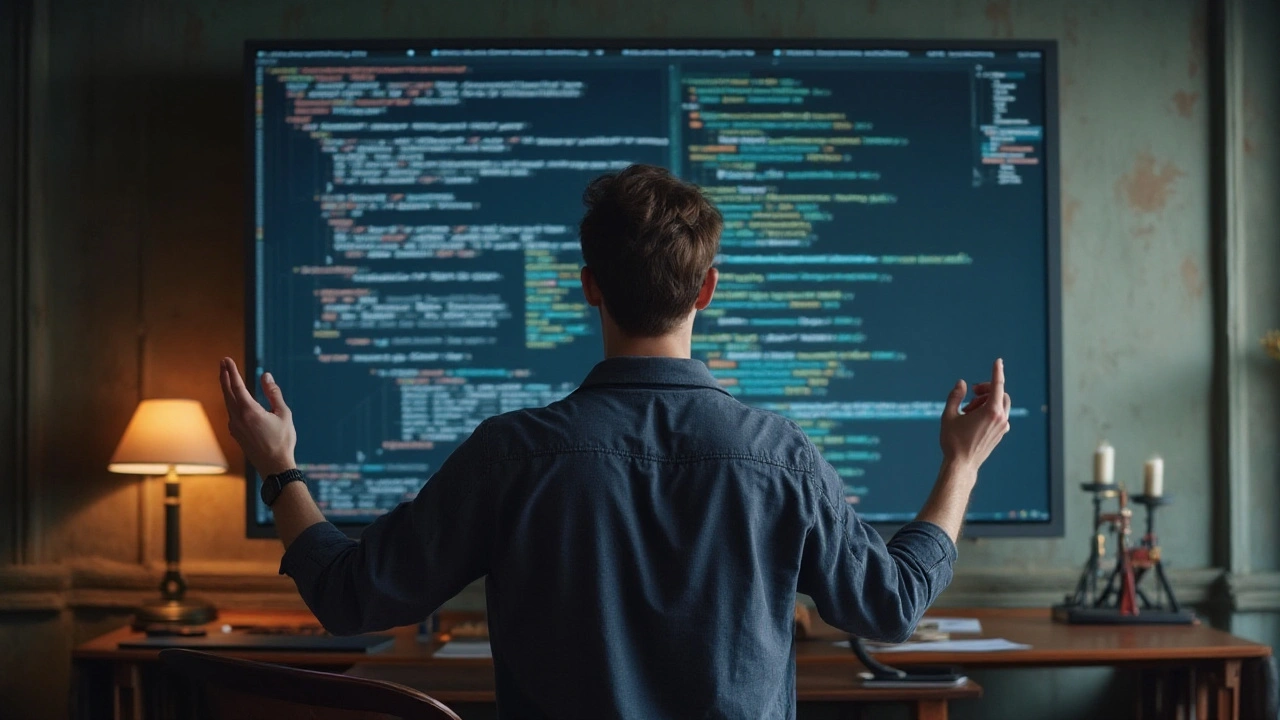Diving into the world of coding can feel like a vast ocean, full of potential yet a bit overwhelming at times. But here's the good news — with the right strategies, you can navigate these waters smoothly and become a more proficient coder.
The starting point for any coder is consistent practice. Just as an athlete hones their skills through regular training, a programmer sharpens theirs by writing code every single day. This habit not only builds muscle memory but also turns the theoretical knowledge into practical skills.
Another invaluable resource is participating in code reviews. By dissecting others' code and allowing others to critique yours, you gain fresh perspectives and learn efficient coding practices. Think of it as having a personal mentor right in front of you, guiding you through each line of code.
Of course, the internet is a treasure trove of learning materials — from tutorials and forums to coding platforms. These resources offer guidance and exercises that suit every learning style, making them key tools in your coding arsenal.
Don't shy away from venturing into new programming languages. It's not just about increasing your toolset, but also about seeing common programming patterns and concepts from different angles.
Lastly, remember the power of community. By collaborating and sharing knowledge with fellow programmers, you open yourself up to a world of ideas and support. This collective progress ensures that you are constantly learning and growing as a coder.
- Daily Practice and Persistence
- Understanding Code Reviews
- Leveraging Online Resources
- Exploring New Programming Languages
- Collaborating and Sharing Knowledge
Daily Practice and Persistence
When it comes to honing your coding skills, there's no shortcut to consistent practice. It's often said that practice makes perfect, and this is doubly true in the world of programming. The habit of coding every day might seem intimidating at first, but it gradually turns complex concepts into second nature. With each line of code you write, you not only solidify your understanding of software development but also build a kind of muscle memory that makes coding intuitive.
Consider setting a regular schedule for coding, just as you would for any other important task. Allocating time each day specifically for this purpose helps in maintaining a rhythm, much like how musicians practice scales or athletes follow a workout schedule. Even dedicating as little as 30 minutes each day can lead to significant improvement over time. The daily commitment develops discipline, which is crucial when facing tougher coding challenges. And remember, it's perfectly fine to start small as long as you're consistent.
In the early stages, you might find yourself tangled in errors or spending more time Googling solutions than actually coding. This is a natural part of the learning process. Every seasoned programmer has faced these hurdles, and each solved problem becomes a lesson in resilience. By coding regularly, you encounter varied problems, equipping you with the ability to adapt and innovate. It's much like learning a new language; the more you immerse yourself, the more fluent you become.
Have you heard Bill Gates' famous words?
"Most people overestimate what they can do in one year and underestimate what they can do in ten years."This wisdom applies predictably well to improve coding. Through persistent effort and regular practice, over time, you'll likely exceed your own expectations of what you can achieve. Imagine yourself a year from now, with a richer understanding of coding fundamentals and a more robust capability to tackle complex projects.
To motivate yourself further, track your progress. Consider keeping a coding journal where you log daily activities and reflect on what you've learned. This not only reinforces what you've covered but also highlights your growth, which can be incredibly motivating. It’s fascinating to look back after a few months and see how much you've evolved.
Additionally, incorporating coding challenges or joining communities like those on GitHub or Stack Overflow can provide a sense of camaraderie and support. These communities not only offer a platform to share knowledge but also help make the learning process less isolating and more interactive. Engaging with like-minded individuals can be a great motivator, and you might even find yourself picking up new tips and techniques just by being part of the community.
For those who thrive on measurable targets, setting milestones or coding goals can be highly effective. Perhaps aim to build a small application by the end of the month or explore a new programming concept each week. By creating achievable short-term goals that align with your broader learning objectives, you stay focused and engaged. This method breaks down the gigantic task of learning to code into manageable chunks.
Understanding Code Reviews
Jumping into a world where code reviews are a part of your routine is like having a seasoned pilot guide you through turbulent skies. It’s an art that marries learning and sharing, ensuring that every coder gets to hone their skills. At the heart of every code review is the brilliant opportunity to learn from peers and mentors alike, transforming good coders into great ones. Not only do these reviews catch bugs and optimize systems, but they also create a fertile ground for exchanging knowledge about the best coding practices and embracing diverse ways to solve problems.
One often underestimated power of code reviews lies in their role as incredible teachers of consistency and readability within a programming project. When your peers decipher your code, it encourages you to write with clarity, foresight, and simplicity, making the code accessible for future devs who may interact with your work. If you're fortunate, you might even get to see brilliant structures and strategies that hadn’t even crossed your mind. Code reviews sharpen communication, promote constructive criticism, and result in a strong team dynamic. After all, writing code that communicates its intent well is just as crucial as ensuring it executes flawlessly.
Moreover, code reviews align with quality assurance processes. They ensure adherence to design patterns and coding standards, becoming an informal training session on corporate coding culture. This practice strengthens the foundation of any software development lifecycle and boosts product quality. When done correctly, developers not only identify software defects but enhance their logical and critical thinking skills. Consider this reflective thought by Jon Skeet, a highly respected programmer:
"The beautiful thing about code reviews isn’t just that they reveal coding mistakes, but rather that they’re fertile learning opportunities from which brilliant ideas often spring."
Code reviews are not without their challenges. Sometimes, they can be reduced to box-ticking exercises devoid of any real value, especially when egos get in the way. These pitfalls can be avoided by fostering a culture of positive engagement, one where reviewers and developers view the process as a collaborative effort towards improving software development. It's about breaking the stigma surrounding critique and instead creating a nourishing environment fueled by curiosity and the desire to grow together as a team.
For those involved in code reviews, there's a tactical approach to implementing feedback effectively. It's essential to provide context and examples wherever possible, making sure that each suggestion is backed with reasoning. Here’s a structured method that has worked wonders for many:
- Begin with highlighting the strengths of the code to set a positive tone.
- Point out areas of improvement with specific suggestions or alternative coding strategies.
- Engage in a dialogue if there's a disagreement, providing a platform for negotiation and shared learning.
- Finally, make sure to recognize improvements in a subsequent review to encourage progress.

Leveraging Online Resources
Navigating the vast world of coding often feels like setting sail in uncharted seas. However, one of the most powerful tools in your coding toolkit is access to online resources. The internet is akin to a giant library that's freely available at your fingertips, offering an endless supply of tutorials, guides, and forums that can help elevate your programming skills. When feeling stuck or in need of inspiration, a quick search can yield thousands of solutions and insights that wouldn’t have been as easily accessible just a few decades ago.
Begin with video tutorials, an ideal starting point for visual learners. Platforms like YouTube and platforms like Codecademy or Khan Academy offer lessons by industry experts, often breaking down complex topics into digestible pieces. Watching these in action not only demystifies intricate algorithms or data structures but also allows programmers to learn at their own pace, pausing and replaying segments until they fully grasp the concept. This feature is a blessing for those who learn through repetition and practice. To quote a popular educator, "In the world of coding, you are never truly alone. There is always a community, just a search away, ready to guide you."
Interactive Coding Platforms
The advent of interactive coding platforms like LeetCode, HackerRank, and CodingBat has been a game-changer for aspiring and practicing coders alike. These platforms present users with real-world coding problems to solve, reinforcing concepts and techniques learned in theory. They offer a gamified experience that can make learning coding skills more engaging and less intimidating. Also, the instant feedback provided by these platforms helps in understanding errors and refining solutions effectively. A coder can track their progress through motivational badges and rankings, instilling a sense of achievement and spurring them to keep advancing.
Moreover, the richness of forums like Stack Overflow and GitHub cannot be overstated. These platforms are built on the spirit of collaboration and knowledge-sharing. Whether you're dealing with a bug that seems impossible to crack or seeking innovative ways to optimize your code, these community-driven platforms connect you with professionals who’ve oftentimes faced similar hurdles. GitHub, in particular, extends an expansive universe of open-source projects to browse and contribute to, proving it's not just about learning from ports but also about giving back.
One should not underestimate the power of online certifications and coding bootcamps either. Websites like Coursera, edX, and Udemy offer certified courses from prestigious institutions, which not only build skills but look great on a resume too. These courses often come with structured schedules, deadlines, and peer discussions—ideal for those who thrive with a clear-cut goal in sight.
- Video tutorials on YouTube
- Interactive platforms like LeetCode and HackerRank
- Forums and collaborative spaces like Stack Overflow
- Online certification courses from sites like Coursera
- Open-source contributions on GitHub
In summary, the wealth of online resources today is an invaluable ally in the ongoing journey to enhance coding skills. By interlacing traditional study with the modern, connected world, learners are better equipped than ever to turn challenges into victory, embracing learning as a continuous, enjoyable process.
Exploring New Programming Languages
Venturing beyond your current programming language can offer numerous benefits, unlocking opportunities to develop more comprehensive and versatile skills. In an ever-evolving field like software development, it’s imperative to stay up-to-date with the latest languages that are shaping the industry. Each programming language has its distinctive features and applications, enriching your coding skills toolkit. Take, for example, the transition from a language like Python, known for its elegance and ease of learning, to something like Go or Rust, which offer impressive performance and safety features. Trying new languages provides not just diverse syntax knowledge but a deeper understanding of programming paradigms too.
One might begin with scripting languages before diving into more system-level languages, but what does exploring a new language truly entail? It means adapting to different syntax rules, learning unique libraries or frameworks, and embracing new problem-solving approaches that are specific to that language. In this journey, the key is curiosity. Begin by identifying what the new language excels in or which industries prefer it – is it web, mobile, systems programming, or artificial intelligence? Research is crucial to ensure the language serves a purpose in your career trajectory or current projects.
"Programming is the art of thinking clearly." – Steve McConnellBy bravely stepping into unfamiliar coding territory, you challenge yourself to think clearly and adaptively. Edifying experiences often lie in mistakes and retrying, both of which are invaluable learning steps. This exploration also fosters creativity; at times, the unfamiliar constraints of a new language can lead to unconventional solutions. As you become more proficient, your confidence across diverse coding projects and collaborations will grow, making you a more attractive candidate in the job market.
Practical Approach
So, how do you effectively learn a new programming language? Start with a structured course or tutorials online. Platforms like Coursera, Udemy, or Codecademy often offer beginner to advanced content available at your own pace. In addition, programming communities such as Stack Overflow or language-specific forums are excellent spaces to clarify doubts and get advice from seasoned programmers. Building small projects or contributing to open source projects are great ways to apply what you've learned, reinforcing programming concepts while allowing you to see the practical side of the language.
The trick to mastering any new language is consistency. A regular practice schedule where you dedicate a set amount of time daily ensures steady progress. Finally, don't hesitate to highlight any language-specific achievements on your portfolio or GitHub, displaying your eagerness to diversify your software development repertoire. Remember, every language learned shapes you into a more effective problem solver across platforms and industries.

Collaborating and Sharing Knowledge
One of the most fulfilling aspects of becoming a proficient coder is the potential to collaborate and share knowledge with others. Whether it's through contributing to open source projects, joining coding communities, or participating in local coding meetups, these interactions fuel growth that solo endeavors often cannot match. Collaboration in coding creates an environment where ideas can flourish, and solutions are refined through the collective input of various minds. It offers a unique opportunity to learn from the diverse experiences of fellow programmers, each bringing a different perspective that might have been overlooked.
Engaging with others in coding projects often highlights the power of teamwork. Beyond the immediate benefits of division of labor, collaboration helps in seeing alternative methods of tackling problems, something that might not be evident when working in isolation. Sharing knowledge is a two-way street; as you communicate your understanding of code, you are also solidifying your own grasp of the concepts. Learning in such environments often leads to those 'aha' moments where complex ideas finally fall into place, resulting in a deeper understanding of programming.
A valuable aspect of knowledge sharing is the mentorship and peer relationships that often form. These connections foster a sense of community and belonging that is invaluable to personal and professional growth. When coders come together, the exchange of ideas often leads to innovative solutions, making problems that once seemed insurmountable much more approachable. As the saying goes, "two heads are better than one," or in this case, many minds working together can achieve remarkable feats.
Statistics show that coders involved in groups or communities often report a higher rate of improvement in their skills. Let's say, for instance, a developer consistently participates in code reviews or hackathons; they are more likely to stay updated on emerging trends and technologies. These platforms offer avenues to test skills in real-world scenarios beyond the theoretical confines of self-study. It's through these practical applications that theoretical knowledge is tested and validated, equipping programmers with confidence in their skills.
Don't underestimate how much there is to gain from these interactions. When you engage with others and willingly share what you know, everyone benefits. Such collaborations don't just enhance individual coding abilities; they contribute to the broader ecosystem of software development by nurturing innovation and facilitating the continuous evolution of technology.
"Individually, we are one drop. Together, we are an ocean." - Ryunosuke SatoroSo, whether through contributing code, sharing best practices over a coffee, or engaging in forum discussions, embracing collaboration and knowledge sharing is a step toward unlocking the full potential of your coding journey.

